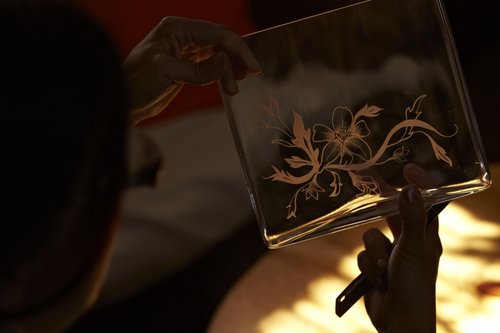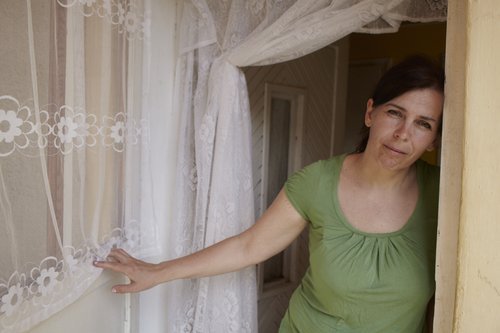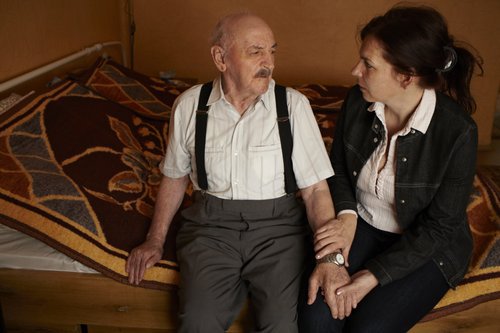Ágnes studied at vocational school, worked in a factory for 17 years and then they sent her away. Without a degree, nobody wanted to employ her. Her dreams did not come true, but she was able to stand up and start a new life. She found her place in a reformed congregation and now works with people as one of the most active members of her congregation. We talked with her as a participant of the 1% campaign of this year.
You live in a beautiful but outlying village. What can we know about Abaújvár?
This is a small, unpopulated village at the border of Hungary, there is no railway here, schools and factories are far away. Middle-aged people go away to find work and the young people don’t want to stay here and farm. Mainly old people stayed. I was born here, but then the school moved to Gönc, so I went to a college when I was ten. My three siblings live in Budapest and I stayed here because I studied porcelain painting.
Why did you want to be a porcelain painter?
As a child I loved drawing, I visited special drawing courses at school. I heard about this profession one time and I really liked it. I considered it special and beautiful. My parents and my friends wanted to dissuade me. They said I have better abilities than going to a three-year-long vocational school, but I was determined that I should graduate. My dad still reproaches me, saying that I failed the entrance exam on purpose.
Could you make your dream come true?
No, because I could not do what I wanted to do. I graduated from the porcelain painting department at Sátoraljaújhely and then I worked for 17 years at the china factory of Hollókő. I could paint only for one or two years and then I had to do monotonous work that was very exhausting. I wanted to graduate but I married and my little baby girl was born. After child care they changed my position at the factory and treated me like a robot. As women, we had to lift heavy weights.

How did you join into the life of the local congregation?
I was baptized as a Reformed Christian. I visited church, but I didn’t really know anything about God. As a child I prayed to Him, but I was afraid of Him. When I went to high school I left the congregation and then I get married and moved to Nagyhuta, where there was no reformed congregation. In the factory a small community formed, but after our marriages we didn’t keep in touch. We lived very isolated. I yearned for a community. When we moved back to Abaújvár, our life started to change.
What happened?
While we were living in the other village, a new pastor couple arrived to renew the congregational life of Abaújvár. They organized spiritual and community programs for the congregation. I often walked with my baby in front of the parsonage (parókia??) and talked with the wife of the pastor who invited me to the congregational events. First we started to go to worships and then to Bible studies. These were refreshing occasions in our monotone work. I learnt how to pray with my own words, how to understand the Word of God. I started to see His work in every detail of my life.
Also, in the loss of your job?
Inside I was happy about it, because we had to walk more kilometers after the exhausting working hours from bus stop to home. Because of this hard work, I had several physical problems also. When I lost my job, these problems went away. If God had not opened a new door to me, I am not sure I would have been able to bear all these problems anymore.
So I think it was hard for you…
This period was very hard for us financially. That year the nursery closed in our village, my mom lost her job and we lived only from my husband’s support. We had to save money to pay the bills and buy food. During this period I was really close to being depressed. It was very hard.

What was the thing that helped start again?
I knew I was more, and I wanted to be an example for my daughter. After a job interview she told me that when she grows up she wants to be unemployed too. Worships were also a big help to us to stay in community and talk about our problems. Faced with the fact that everywhere I applied I need a degree, I did a one-year long social care and nurse course and I decided to graduate. In 2010, I applied for Pálháza, and in three years I finished high school through a correspondence course. It was not easy, but I think I did my best.
And meanwhile you found a new workplace…
Yes, thanks to the pastor couple. They wanted to find a workplace for me before, because they didn’t want us to move from the village. There was a time when my husband and I wanted to move to Budapest like my siblings. In 2011, the congregation started a home care program and asked me to participate in it.
How does it feel to work again?
In the beginning it was very frightening to work with people, after material objects, but God helped me, and now I consider this work as my profession. I nurse nine old people: I visit them every day, buy their medicine, do shopping for them and talk with them. Lonely old people really miss conversation. Few people like to care for old people, because they live in their second childhood because of their illnesses. In this age experience success is very rare but I learn from them a lot.

What did the happenings change in you?
Looking back I see that my life had its own way, and after a break everything changed. I’m happier, more open. I don’t worry about financials because I know God gives everything that we need. I love this intense life. With other members of my congregation we organize programs for children, bake for the older people. I started to engrave souvenirs, so I can use my artisan knowledge. I feel that I can be myself in my community.
And what’s the next step?
I’m more positive regarding my future. I graduated and I want to have a diploma. I do my first year at the Reformed Theological Academy of Sárospatak at the department of community building. We will see the rest, but I trust Him.
Why did you decide to participate in the campaign?
I didn’t think I was right for it, but I found the possibility very interesting, and if I can serve my congregation and my people with it, why not? I hope I can be an example as a thirty-year-old student for those who are not brave enough to change their life. I talked to a lot of people who were afraid of reading aloud, for example, but for me it is not a problem, I’m really enjoying it even! It makes me feel younger.
“1% support, 99% spirit”
The personal 1% ads of the RCH in 2014 want to voice the repentance and inside-outside changes that it produces. We were looking for real stories, real people, whose life, lifestyle and atmosphere changed because of the acceptance of the Gospel and the service of the Reformed Church. We showed three “transfiguration stories” until the end of May. The first one was the story of Zsolt, who lives a clean life after quitting drugs. The second is the story of the foster parents Edit and László.
Written by György Feke; translated by Nóra Csobán
Photos: András Hajdu